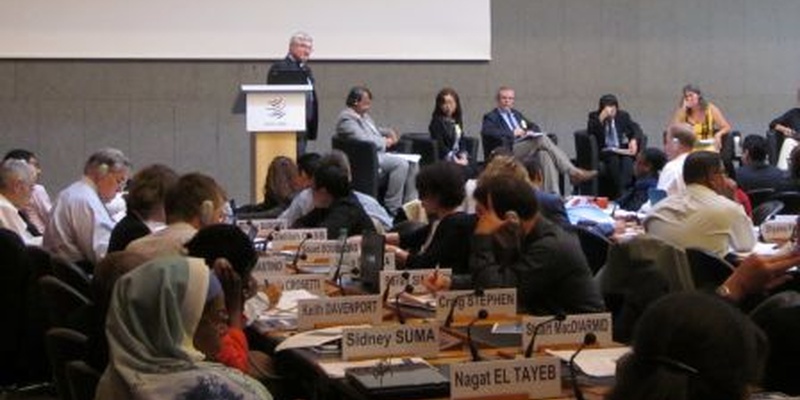Seminar on International Trade and Invasive Alien Species IAS) 12-13 July 2012 and meeting of the Inter Agency Liaison Group on Invasive Alien Species IALG on IAS) 13 July 2012
Posted on Tue, 25 Sep 2012, 08:10

IPPC participated in a workshop organized by the Standard and Trade Development Facility ( STDF), the IPPC and the World Organization for Animal Health (OIE), 12 and 13 July 2012. Three IPPC Secretariat staff members intervened in the meeting, to underline what has been done in invasive alien species management. What emerged is the importance of the link between international trade and IAS.
Ms Ana Peralta, Implementation Officer, highlighted , from the IPPC perspective, the improvements and all the work done in order to get over the difficulties in controlling the introduction and spread of IAS through international trade.
Then Mr Brent Larson explained how much IAS falls into the competences of international trade and the mandate of the IPPC, since it is recognized as an international standard setting body under the WTO SPS agreement (SPS stands for Sanitary and Phytosanitary). Moreover, the term pest broadly used by the IPPC, relates to the term invasive alien species. Finally, he clarified how IAS issues can be considered crucial for the SPS community, and then for the IPPC mission.
Mr Washington Otieno, who is a consultant for the Secretariat, on the contrary, intervened on the topic Internet trade and risks of introduction of IAS and Aquatic plants: new insights from the IPPC perspective on a longstanding challenge, with his presentation entitled: Emerging pathways and challenges in the area of trade-related IAS.
Participants in the workshop agreed on the fact that the first step in order to manager in an efficient way the risk correlated to IAS is strengthening SPS capacities, but this could not be considered sufficient.
It is important to better control these dangerous species through other key actions; here there is the list of some identified possible factors that can help deal with IAS.
-
boosting continuing efforts to improve the way the relevant international organizations work together, support each other and strengthen each other s ability to implement the SPS Agreement and global biodiversity conventions
-
ensuring existing international standards are implemented better, to prevent trade from spreading harmful alien species - and developing new standards where needed
-
boosting countries ability to undertake scientific risk analysis and other studies, particularly in developing countries
-
improving coordination between ministries and other agencies within countries, between countries and within regions - the agencies concerned have diverse responsibilities, from law enforcement, customs and trade to agriculture, fisheries, forestry and environmental protection
-
enhancing cooperation between governments and industry
-
raising public and political awareness
-
studying potential risks associated with the growth in Internet trade, and how to address them
During the meeting of the Inter Agency Liaison Group on Invasive Alien Species, on 13 July 2012, members of the IALG on IAS had the opportunity to provide updates of the activities of the organization, including, for example capacity building activities and they also had the chance to discuss about the workshop of the STDF on IAS.
The participants were asked to request the heads of their organizations to write to the head of the World Custom Organization, the International Maritime Organization (IMO) and the International Civil Aviation Organization to solicit the participation in the IALG and to inform them about its activity.
In particular the IPPC was asked to follow up the Convention on Biodiversity and to give information about the publication entitled: Considerations for implementing international standards and codes of conduct in national invasive species strategies and plans (Aug 2011) and to join the Global invasive alien species information partnership (June 2012).
Finally, FAO/IPPC offered to host the next meeting at the beginning of February 2013 at FAO Headquarters in Rome, Italy.

